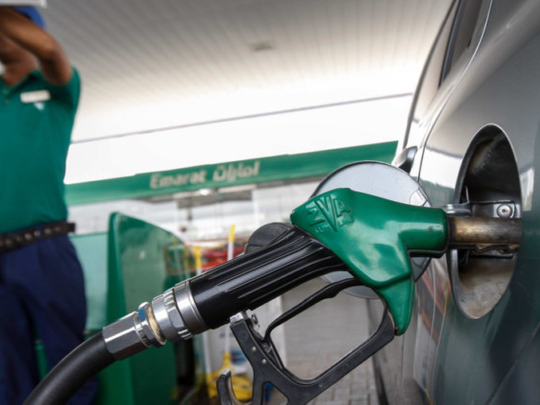
Abu Dhabi: Emarat will not expand its fuel retailing business in Dubai in the foreseeable future as the company feels its existing filling stations in the emirate are more than adequate to meet customer needs.
“For now, our current infrastructure will cater to Dubai’s existing as well as its future demand. We feel, there’s still a surplus capacity at our filling stations in Dubai,” Emarat’s General Manager Adel Khalifa told Gulf News in a telephone interview.
“Our objective and our mandate from the government is to satisfy customers’ needs and we continue to cater to their needs. The fuel is always available in sufficient quantity at our pumps, there’s no congestion of cars and there are no dry outs at our filling stations,” Khalifa said.
Meanwhile, another source close to the developments at Emarat told Gulf News that the company wants to cap its losses from selling subsidised petrol and it can do so by putting its expansion plans in fuel retailing on hold. Emarat currently sells about 2 million litres of petrol in Dubai daily and loses an estimated Dh82 million a month from selling the fuel below its cost.
“Adnoc Distribution plans to open two filling stations in Dubai by the end of the year and 10 stations over the next five years. We will let Adnoc Distribution to take greater market share as with the increasing petrol sales, our losses will grow as well,” the source said.
As matters stand, Dubai-based oil retailers, including Emarat are mandated by the federal government to subsidise the pump prices of petrol despite paying for the fuel at their prevailing international prices.
Khalifa said the current pump prices of petrol in the UAE reflected a crude oil price of about $65 per barrel. On Friday, the benchmark Brent crude oil settled at $104.88 a barrel on the ICE Futures Europe, the London-based energy futures exchange.
However, the source said, Emarat had more than halved its losses from petrol sales in recent months after 74 of its fuel outlets were taken over by Adnoc Distribution in the Northern Emirates.
“Including Northern Emirates petrol sales, our monthly loss was almost Dh165 million. That’s come down, significantly as we have now operations only in Dubai. Since January, Adnoc Distribution has taken over the full maintenance, dealer operations, finance and contracts of the 74 pumps that we had in the Northern Emirates.” he added.
The source said Emarat, for its future growth, will expand in liquefied petroleum gas sales business, aviation fuel, oil terminal and storage, lubricants, marine bunkering and natural gas transmission businesses.
Adnoc Distribution is a unit of the Abu Dhabi National Oil Company (Adnoc). Last year, in May, Adnoc and Emarat announced the signing of a memorandum of understanding (MoU) through which Adnoc’s unit took over the running of 74 petrol stations operated by Emarat in Sharjah, Ras Al Khaimah, Ajman, Umm Al Quwain and Fujairah. In this deal, no financial transaction was involved and the Emarat retail section employees were to be absorbed by the Adnoc unit as part of its expansion plan.
In 2011, billions of dirhams were pumped into Emarat, its capital increased by 50 per cent to Dh9 billion. This allowed the banks lending to Emarat to increase their ceiling on loans to Emarat.
As matters stand, the UAE state oil marketing companies incur heavy daily losses on petrol sales due to the difference between state-set prices and the cost of the fuel’s imports. Emarat had debts of around Dh1.9 billion, the Federal National Council (FNC) said in January 2011. The four UAE oil retailers — Adnoc Distribution, Enoc, Eppco and Emarat — are paid by the government to cover the cost of subsidies.
Adnoc Distribution’s subsidies are directly borne by the Abu Dhabi National Oil Company, while Emarat’s operating budget is approved by the Ministry of Finance with additional subsidies borne by the UAE federal government. The cost of other retailers’ subsidies — Enoc and Eppco’s - is borne by the Dubai Government, the owner of the Enoc Group of Companies.
The UAE government suffered an estimated Dh8.5 billion in losses in 2011 by supporting the four oil distribution companies.












